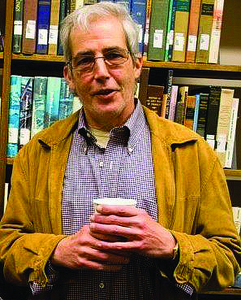

Edison Jennings
The python's manners are quite crude.
It squeezes its prey and gulps its food.
Edison Jennings says he was "6, maybe 7, when I wrote that masterpiece. I wrote it just to entertain myself and maybe show off to my parents. They weren't all that impressed."
Their initial reaction to his childhood poem didn't stop Jennings from continuing to express himself and search for meaning through his poetry.
"I'm not sure why I focus so much on poetry," he says. "I guess I like the density, the wit, and the figuration of poetry. And the way it sounds-primarily the way it sounds. I write poetry in rhymed, blank and free verse. With rhymed verse, I usually fool around with ballads and sonnets, though I have been known to mangle terza rima (an arrangement of triplets that rhyme aba, bcb, cdc, etc.) from time to time. Most of my poems, though, have been free verse."
He says that poetry delights him and reminds him of who he is and says "those two answers are not as self-centered as they might seem."
Jennings uses his poetry to try to come to terms with the conflict between beauty and suffering and to explore other concepts familiar to everyone: loss, gain, triumph, defeat, joy, suffering, love and loneliness.
"The world is both beautiful and cruel; living things suffer and die in the midst of unspeakable magnificence. How to come to terms with that? I don't know. Maybe poetry might offer a clue?"
Walt Whitman, Emily Dickinson, Wallace Stevens, Robert Frost and Elizabeth Bishop inspire Jennings. He also enjoys the contemporary poetry of Frank Bidart, Charles Wright and Derek Walcott. But when it comes to thinking about why poetry is important to society, Jennings turns to Percy Shelley.
"In the last seven centuries, with the exception of the Renaissance and the late Middle Ages, poetry has never had much immediate influence and virtually no direct influence on social organization and policies, and all that entails. But (always the "but') Percy Shelley wrote that poets are the unacknowledged legislators of the world. On the surface, that does not make any sense.
"But if we remember that verse evolves out of the proto Indo European root, wer, to turn, and therefore pervert means to turn away, and subvert, to turn underneath, then Shelley's assertion seems more credible. Also, it is well to remember that poetry evolves from the Greek word, poïesis, to make.
"Furthermore, for Shelley, all poets are "makers' in a broad sense, including sculptors, painters, musicians, etc. So, poetry turns away in its making and must be subversive, in the broad sense-turning and moving underground, but eventually reemerging in our language, our consciousness and our shaping of experience.
"No one knows this better than the folks who craft media content, particularly marketing content-that includes political marketing. Thought of in that sense, Shelley might have been right, after all. Maybe poets do legislate, not in the sense of political law making, but by subtly and slowly legislating our consciousness. Over time, poets shape our language and therefore, our experience. This subversive shaping has no inherent moral value. In other words, poetry legislates either to our advantage or detriment, dependent on the poet and the audience."
Jennings writes every day, in the morning on weekends and in the evening during the work week. He says he doesn't wait for his muse to strike, because "the muse jilted me long ago – she's a social butterfly."
When he isn't writing, Jennings teaches at Virginia Intermont College in Bristol, Va. He says that he encourages his students to read and "I encourage them to try different approaches to poetry. I encourage them to loosen up. Many, many folks encouraged me, all sorts of folks, not just writers. But I will name a few local writers who have been generous and helpful with my efforts. In no particular order, they are: Adrian Blevins, Mark Roberts, Dan Stryk, Larry Richman, Ann Richman, Errol Hess, Felicia Mitchell, James Owens and Sam Rasnake."
Jennings earned a Bachelor of Arts while serving on active duty as an enlisted air crewman in the U.S. Navy. After military service, he completed a Master of Fine Arts at the Warren Wilson Program for Writers, Swannanoa, N.C. He lives in Abingdon, Va. His poems have appeared in a variety of journals and anthologies, including "Boulevard," "Kenyon Review," "Rattle," "Slate," "Southern Review," "Southwest Review," "Triquarterly," "Valparaiso Poetry Review" and "Zone 3." In November, 2013, Jacar Press published his chapbook, "Reckoning."
******************************
Spherical Trepidation
Nothing's far beyond our ken.
Heather McHugh, "Far Niente"
So there's the North Star, not too bright
among the more illustrious,
but glinting like a battered nail
from which the weight of heaven swings,
and nothing holds the nail in place
except the void it's stuck in.
For heaven's sake, old nail, hold tight.
By Edison Jennings
First published in Nantahala Review, 2005
Reprinted with permission